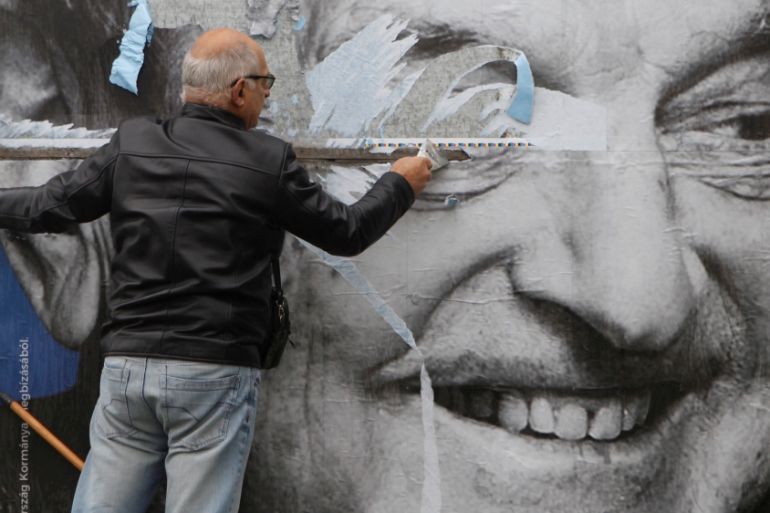Hungary rights activists risk prison under ‘Stop-Soros’ bill
Draft bill, named after Hungarian-American billionaire George Soros, targets NGOs and people who help refugees.

Budapest, Hungary – Aliz is no longer as open about her NGO work as she used to be.
Reluctant to give her full name, the refugee rights activist from Budapest says a measure of self-censorship is necessary to continue her involvement with civil society groups.
Keep reading
list of 4 itemsUN report charts lethal cost of migration over past decade
Conflict, climate, corruption drive Southeast Asia people trafficking: UN
Bodies of three Rohingya found as Indonesia ends rescue for capsized boat
“It would be very easy to say I’m not targeted. I’m privileged. I’m white. I’m European. But people are in different situations, and I really feel that we have to think twice if we risk our [refugee] friends,” says Aliz.
Her caution stems from new legislation, submitted to the Hungarian parliament, that criminalises activities supporting so-called irregular migrants.
Under the proposal, those who distribute food and informational leaflets, or offer legal advice to asylum-seekers could serve jail time.
The UNHCR has asked the Hungarian parliament to withdraw the measure, claiming that it would “deprive people who are forced to flee their homes of critical aid and services, and further inflame tense public discourse and rising xenophobic attitudes”.
The proposed legislation is the latest in a series of draft bills called “Stop-Soros”, which aim to curb civil society groups and NGOs working on asylum issues in the country.
The legislative package is named after the Hungarian-American billionaire philanthropist George Soros, who the government accuses of enabling illegal migration into the country.
![A government billboard displaying George Soros next to a message urging Hungarians to take part in a national consultation about what it calls a plan by the Hungarian-born financier to settle a million migrants in Europe every year [Bernadett Szabo/Reuters]](/wp-content/uploads/2018/05/c0fa64396cfa44fb84c49b4b278e4b8f_18.jpeg)
“Many people feel that it is a risk to raise their voices. I’m not saying that if you say this, for sure you’re going to be fired. But it’s enough to have some stories of people being fired because of their political opinions,” says Aliz.
“We cannot act because of these fears, because of self-censorship.”
A high school teacher by profession, Aliz had been collecting and sharing testimonies from asylum-seekers, giving speeches at demonstrations and speaking to the press about the rights of foreigners and migrants in her country.
But in 2017, she was forced to stop her work when the government passed a law that prohibited access to the border.
Asylum seekers were pushed into container camps in highly secure “transit zones”, a move that garnered strong condemnation from international human rights groups.
‘Mother excuse to crack down’
Hungary has since constructed a fence on its border with Serbia, allowing just two asylum-seekers into the country a day.
“Everything is connected to migration in the government’s discourse,” says Aron Demeter, a spokesman for Amnesty International Hungary. “It’s the mother excuse to crack down on independent institutions.”
The previous Stop Soros bill included a 25 percent tax on foreign funds received by NGOs working on migration. While the new proposal appears to have dropped this provision, the draft legislation now contains language about punitive measures against activists and individuals helping migrants.
“The government just doesn’t want any critical NGOs to exist,” adds Demeter.
The recent bill is yet another attempt by Prime Minister Viktor Orban to prevent migration to Hungary, which he calls a “Trojan horse for terrorism”.
Such rhetoric is par the course for Orban, whose ruling party, Fidesz, won a super-majority in last month’s parliamentary elections, allowing it to pass constitutional changes and laws without any support from the opposition.
Critics say the campaign was tinged with xenophobia and anti-Semitism; billboards across the country featured a smiling caricature of Soros, in addition to images of a faceless mass of non-white men behind a stop sign, reportedly recycled from Britain’s anti-immigrant party, UKIP’s ad.
During the campaign, Orban’s chief of staff posted a video on Facebook of an immigrant enclave in Vienna, claiming that “white Christians” had been pushed out and that Hungary could be next. The video was taken down by Facebook, citing its ban on hate speech, only to be restored as an exception to the company’s rules.
Daniel Mikecz, a political analyst at the Republikon Institute, a liberal-leaning think-tank in Budapest, says that focusing on migration has become a winning strategy for the Fidesz government.
“The point is to find conflicts, develop those conflicts where you can have a majority, and migration is such an issue. Most NGOs and civil society groups won’t be affected by this law. So the government can say there are some NGOs, some activists, that are working against Hungary’s sovereignty,” Mikecz says.
The issue of migration is also connected to the government’s attempt to stave off Hungary’s demographic decline. Liberal democracy as Orban recently said, “has been exhausted” and “fails to deliver”.
Orban has instead espoused the virtues of “Christian democracy” by promoting traditional families and an increase in the country’s birth rate, to defend against refugees described as “Muslim invaders”.
Currently, Muslims make up 0.4 percent of Hungary’s total population.
For activists such as Annastiina Kallius, the debate over migrants and asylum-seekers in Hungary has proven to be broader than it initially seemed. “It came to the point that in chasing this migration issue, we were a bit like Don Quixote chasing windmills,” she says.
“This thing is so much bigger than migration. It affects everything – the schools, the courts, the police, the institutions of this country. That’s why we have to take a step back and reassess.”